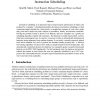Free Online Productivity Tools
i2Speak
i2Symbol
i2OCR
iTex2Img
iWeb2Print
iWeb2Shot
i2Type
iPdf2Split
iPdf2Merge
i2Bopomofo
i2Arabic
i2Style
i2Image
i2PDF
iLatex2Rtf
Sci2ools
115
click to vote
HEURISTICS
2008
2008
Learning heuristics for basic block instruction scheduling
Instruction scheduling is an important step for improving the performance of object code produced by a compiler. A fundamental problem that arises in instruction scheduling is to find a minimum length schedule for a basic block--a straight-line sequence of code with a single entry point and a single exit point--subject to precedence, latency, and resource constraints. Solving the problem exactly is known to be difficult, and most compilers use a greedy list scheduling algorithm coupled with a heuristic. The heuristic is usually hand-crafted, a potentially time-consuming process. In contrast, we present a study on automatically learning good heuristics using techniques from machine learning. In our study, a recently proposed optimal basic block scheduler was used to generate the machine learning training data. A decision tree learning algorithm was then used to induce a simple heuristic from the training data. The automatically constructed decision tree heuristic was compared against a...
Related Content
| Added | 10 Dec 2010 |
| Updated | 10 Dec 2010 |
| Type | Journal |
| Year | 2008 |
| Where | HEURISTICS |
| Authors | Abid M. Malik, Tyrel Russell, Michael Chase, Peter van Beek |
Comments (0)

